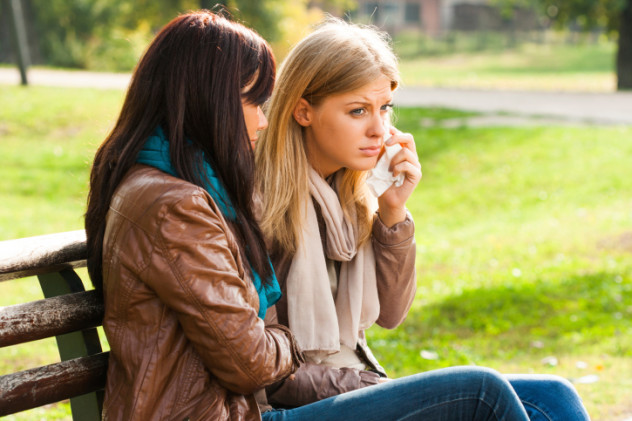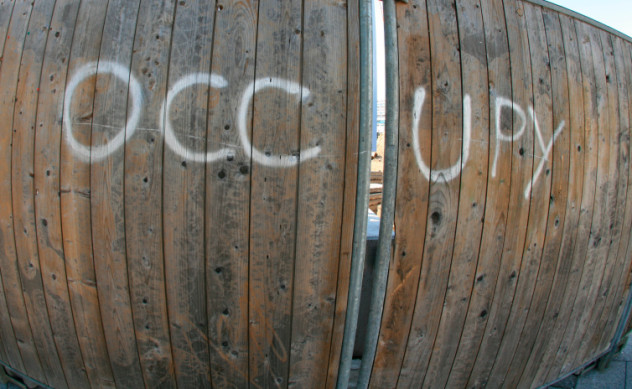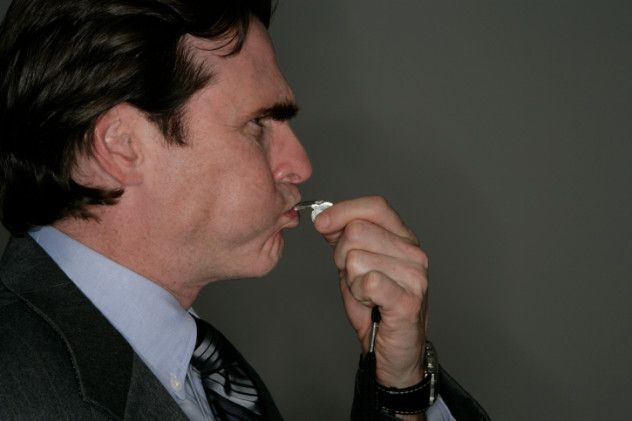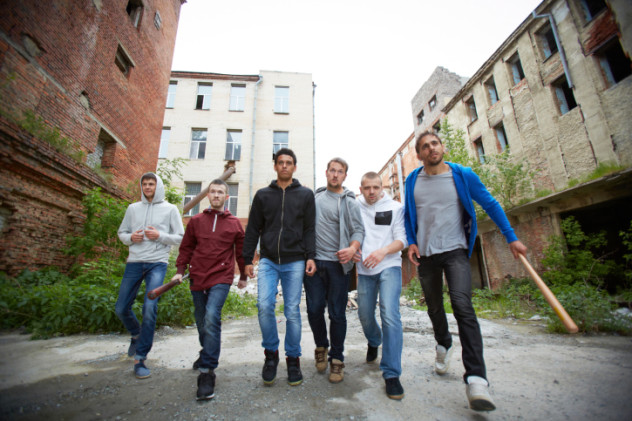SEE ALSO: 10 Incredible Accomplishments That Ruined Their Creator’s Lives Wrong. Despite our parents telling us to always “play nice” and “do the right thing,” experience shows that being publicly minded is usually a one-way ticket to Miseryville.
10Online Activism Makes You Meaner
Picture the scene: You’re cruising Facebook, posting subtly undermining comments to your ex’s timeline, when a petition comes up from a charity desperate to raise awareness for a good cause. Do you do the decent thing and sign it, or simply carry on like nothing’s happened? If you said “sign it,” then congratulations: You’ve just made every charity’s job harder. Last year, a study in New Scientist revealed that people who engage in online activism for a charity are less likely to give than those who don’t. To prove this, scientists assembled an online team of 759 participants and asked half of them to sign a petition on gun control according to their political preferences. They then gave all participants a chance to donate to a pro-gun control or anti-gun control charity, alongside a neutral education charity. While all those who signed the petition were likely to give to one of the gun control charities, they almost never gave to the education one. Even crazier, the overall giving of the signers was 30 percent lower than non-signers. In other words, signing the petition had made them noticeably stingier. But it’s not just petitions that increase meanness.
9Eating Ethically Makes You A Worse Person
Faced with the unmitigated horrors of factory farms and the environmental destruction of flying meat halfway around the world, plenty of us choose to source our food ethically. And while that’s great for the planet, it also turns us into objectively awful people. In 2009, researchers from the University of Toronto set up two online stores. One was a regular supermarket, while the other was a “super green” version. Participants were assigned to one store, and either given money to spend, or simply told to browse. Afterward, all the subjects were given cash and told to divide it up between themselves and an anonymous person. Care to guess what happened next? Those who’d spent money in the “green” store completely ripped off their anonymous partners. Convinced they’d already proved their moral superiority by buying green, they saw no need to treat the rest of the experiment honestly. When the scientists followed up by allowing them to take a specified amount of money from an envelope, the eco-shoppers went even further by taking more cash than they were entitled to.
8Trying To Save A Friendship Can Make You Both Miserable
If sitcoms have taught us anything, it’s that friendships last forever. Even if your wacky buddy from across the hall is dating the woman carrying your baby, everything will work out in the end. One of you just needs to make the effort, right? Well, only if you want to make both of you utterly miserable. Although some friendships are worth saving, often the reason we’re drifting apart from someone is because they’re bad for us. Trying to stay in touch with them can open up a whole can of psychological worms. “Bad” friendships have been linked to everything from fatigue to low self-esteem, and forcing yourself to keep in contact with someone your subconscious hates can be devastating. Hollywood may tell us the awful friend who crashes on our couch really has a heart of gold, but experience suggests he’s really just awful.
7Telling White Lies Can Mess Your Kids Up
Common sense tells us that only a socially maladjusted jerk would tell a kid the truth about things like death. After all, which is most appealing: Telling little Timmy that Rover has gone to live on a farm, or that he’s worm food? That’s why we have the concept of white lies, so we can be dishonest without feeling bad about ourselves. But according to science, we should be feeling more than bad—we should be feeling terrible. In a study published earlier this year, researchers at the University of California, San Diego tested the effects of lying on children. They had an adult tell a little white lie, then monitored how the children themselves lied about sneaking a peek at a toy they weren’t supposed to see. The researchers found that children who’d encountered the “dishonest” adult lied significantly more. While 60 percent of those who hadn’t been lied to were “economical” with the truth, nearly 90 percent of the cohort who’d been on the receiving end of a lie then lied in turn. According to the researchers, the results could be due to children realizing how little adults care for honesty and chucking the whole concept out the window. They warned that even “white lies” could be dangerous, which ties in with other research that suggests lying about the existence of Santa can potentially mess your kids up.
6Promoting A Cause Can Destroy Its Chances Of Success
How would you feel, learning that you were inadvertently doing everything in your power to damage a good cause? Unless you’re Mr. Burns, the answer is probably “terrible.” Well, guess what? If you campaign on behalf of literally anything, that’s probably what you’re doing. In 2013, the European Journal of Psychology published an article that made a shocking connection. When trying to figure out why people generally resist social change, researchers decided to look at our stereotypes of activists. They discovered that most of us hate them so much that we’ll actively kick back against whatever they’re campaigning for. It sounds insane, but think about it: Most of us probably agree, for example, that women shouldn’t be discriminated against just for having ovaries. Yet mention the word “feminist” and otherwise reasonable people will turn into frothing lunatics. It’s the same mechanism that allows you to simultaneously have 43 percent of the American population supporting the views of the Occupy movement, yet very few willing to publicly admit it. In short, if you’ve ever picked up a sign and gone to agitate for change, you might be part of the problem.
5Whistle-Blowing Can Ruin Your Life
But not everyone restricts their good deeds to minor things. Some people make an actual stand, bravely coming forward to tell us about abuses in the banking system, or our hospitals, or even the government. So how do we reward these whistle-blowers? That’s right: by utterly destroying their lives. Although large payouts do infrequently happen, they’re vastly outweighed by the number of times whistle-blowers wind up out of work, out of pocket, and out of home. In 2006, Thomas Drake was a government employee raking in $150,000 a year. Then he blew the whistle on the NSA’s trailblazer project, got chucked out his job, wound up in court, and now works selling iPhones in an Apple store. Unbelievably, he was one of the lucky ones. After Richard Barlow revealed a dodgy US arms deal to Pakistan, he was fired from his Pentagon job, blacklisted by the government, had his marriage fall apart, and was last reported as being penniless and on the verge of homelessness. In Britain, a hospital whistle-blower was threatened with a £500,000 ($810,000) lawsuit for revealing practices which were killing people. But this is more than just anecdotes. A 2011 study concluded that whistle-blowing leads to long-term emotional damage, nightmares, alcoholism, paranoia, and panic attacks.
4Protecting Your Children Can Ruin Their Lives
It’s every parent’s instinct to protect their child from harm—physical or otherwise. The idea of just letting something bad happen to our kids is almost overwhelming, so we step in to shield them from the bad side of life. Only, it turns out this might have the opposite effect from the one intended, by making your child a target for bullies. In 2013, researchers combined data from 70 studies and over 200,000 children to see who was most at risk from bullying. While kids who had mean or abusive parents were most likely to be bullied, there was one unexpected cohort who also got picked on: Those with ultra-supportive and protective parents. According to the study, children apparently need a little distress in their early lives. If they’re sheltered from too many bad experiences, then they fail to learn coping mechanisms. The result is that they fall to pieces when they first encounter a bully, leading them to be picked on for all eternity. In other words, by protecting your child from misery now, you’re ensuring they’ll be miserable later. Moderation is important in parenting, as in many areas of life.
3Exercising Too Much Can Destroy You
Working out is undoubtedly a good thing. Aside from staving off the rolls of fat our cheese-consuming habits should be gifting us, it helps us live longer. We’re always being told to exercise harder, faster, and better. Yet go too far and “keeping fit” can utterly destroy you. Let’s say you decide to chuck in the Oreos and start hitting the gym. Great, so long as you exercise a maximum of 7.5 hours a week. In 2012, researchers at the Teachers College at Columbia University discovered that breaking this limit resulted in depression, anxiety, and deteriorating mental health. But it’s not just your brain that will suffer. Scientists determined that strenuous exercise is bad for your teeth. After noticing the high levels of cavities and tooth decay among Olympic athletes, a group of researchers tested the chemical makeup of our saliva during exercise. They found it becomes increasingly alkaline, to the extent that it could cause serious damage. That’s before we get to the two British studies that suggested daily exercise actually increased the risk of heart attack or stroke. But what about healing workouts like yoga? Sorry, but that could be even worse. According to experts, a huge number of us have underlying weaknesses “that make serious injury all but inevitable,” outside of a limited number of poses. By trying to improve your health, you could be guaranteeing yourself an extended hospital stay.
2Reporting Serious Crime Can Destroy (Or End) Your Life
Without people willing to speak up for the good of a community, gangs would have the run of every street on Earth. The trouble is our governments rarely have decent programs in place to protect witnesses. In fact, some of them seemingly go out of their way to destroy informants. Take the United Kingdom. Once you enter a witness protection program, you effectively lose all your rights. Although the police claim they will relocate you to a similar house, find you a similar job, and guarantee you a similar income, the reality often falls way short. Horror stories abound of professional witnesses who were told not to work until the trial ended, meaning they couldn’t pay off their mortgages, the bank foreclosed, and they lost their homes and savings. In one case, a witness formerly earning £150,000 ($239,000) per year wound up in temporary accommodation, surviving off handouts. Thanks to the outdated system, it’s impossible to bring a grievance against the police. Yet, penury might well be the best outcome. Ordinary people reporting gang activity have had their details leaked to homicidal thugs or have even been murdered after the police refused to offer adequate protection.
1Testifying At The Hague Could Be The Worst Thing You Do
Compared to the sort of guys you see in The Hague’s International Criminal Tribunal for the former Yugoslavia (ICTY), the average gang leader looks like Minnie Mouse. Guys like Ratko Mladic and Radovan Karadzic have slaughtered so many people that a meaningful comparison is impossible. It’s in everyone’s interest to see such scumbags behind bars for all eternity, yet entering the ICTY’s witness program can completely destroy your life. In 2003, Witness B-129 agreed to testify against Slobodan Milosevic for crimes against humanity. Owing to the sensitive nature of the trial, her identity was “guaranteed” to be concealed. Unfortunately, the ICTY accidentally broadcast her real voice on Serbian TV. Almost immediately, police and neighbors began conspiring to kill her. Terrified for her life, Witness B-129 fled the country. This is where things got tricky. There’s no international agreement guaranteeing an ICTY witness shelter, money, or protection once they leave their homeland. Witness B-129 wound up in a squalid, mold-filled apartment hundreds of miles from her home. Since she couldn’t show her diploma to employers, she was forced to take demeaning, minimum-wage jobs to make ends meet, yet still wound up trapped in a cycle of debt the ICTY did nothing to relieve. Officials broke promises to sell her apartment in Belgrade and help her out with money—and it was all for nothing. Milosevic died before he could be sentenced. Because she wanted to stand up for what was right, Witness B-129 wound up having her life utterly, pointlessly ruined.
























